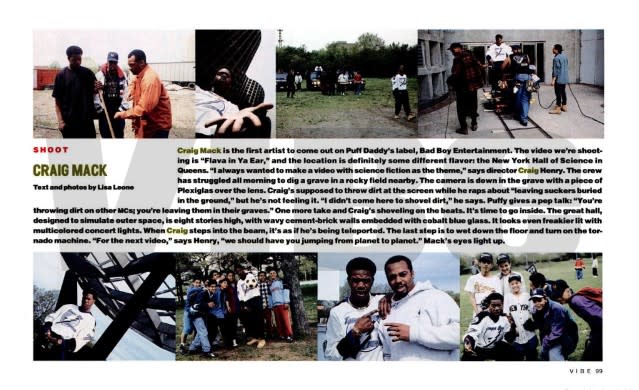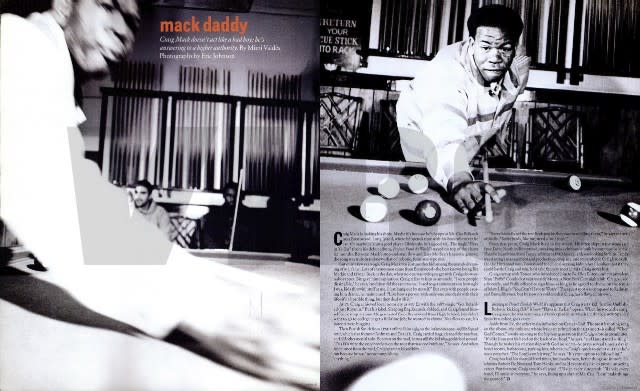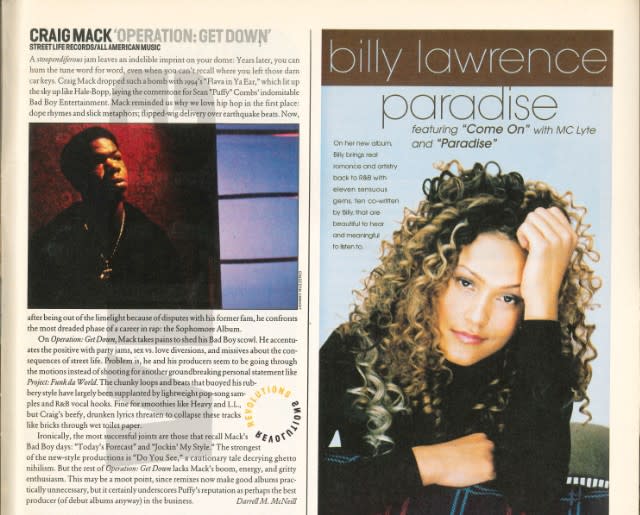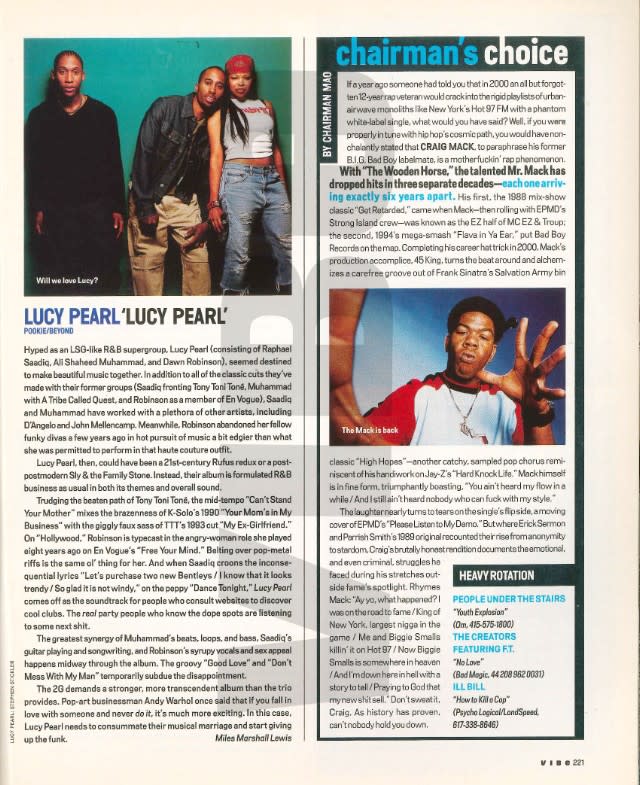From The Vault: Revisit Craig Mack’s VIBE Magazine Features
By VIBE
By reading passages of rising to established artists of the past, you get to grow closer to the person they used to be and the person they became throughout life’s dealings. For Craig Mack, he was described as a hungry young rapper that took any opportunity handed to him before he became responsible for shaking up hip-hop with his debut single “Flava in Ya Ear.”
Mack not only left an impact through his rhymes but also through the descriptions of storied journalists. Since his death on Mar. 12 from suspected heart failure, the 46-year-old artist sparked an outpour of stories across the Internet from writers and collaborators that knew him best. From 1995 to 2000, here’s what previous VIBE writers had to say on Mack’s trajectory during the length of his rap career.
–

Credit: VIBE Magazine
Shoot: Craig Mack In Outer Space (August 1994)
By: Lisa Leone
Craig Mack is the first artist to come out on Puff Daddy’s label, Bad Boy Entertainment. The video we’re shooting is “Flava In Ya Ear,” and the location is definitely some different flavor: the New York Hall of Science in Queens. “I always wanted to make a video with science fiction as the theme,” says director Craig Henry. The crew has struggled all morning to dig a grave in a rocky field nearby. The camera is down in the grave with a piece of Plexiglass over the lens. Craig’s supposed to throw dirt at the screen while he raps about “leaving suckers buried in the ground,” but he’s not feeling it. “I didn’t come here to shovel dirt,” he says. Puffy gives a pep talk: “You’re throwing dirt on other MCs; you’re leaving them in their graves.”
One more take and Craig’s shoveling on the beats. It’s time to go inside. The great hall, designed to simulate outer space, is eight stories high, with wavy cement-brick walls embedded with cobalt blue glass. It looks even freakier lit with multicolored concert lights. When Craig steps in the beam, it’s as if he’s being teleported. The last step is to wet down the floor and turn on the tornado machine. “For the next video,” says Henry, “we should have you jumping from planet to planet.” Mack’s eyes light up.
–

Credit: VIBE Magazine
Mack Daddy (February 1995)
Craig Mack doesn’t act like a bad boy; he’s answering to a higher authority.
By: Mimi Valdes
Craig is making shots. Maybe it’s because he’s happy at Mr. Cue Billiards near Brentwood, Long Island where he spends time with his boys whenever he can. Or maybe he’s just a good player. Obviously, he’s a good MC. The single “Flava in Ya Ear” (from his debut album, Project: Funk da World) stayed on top of the charts for months. Between Mack’s stop-and-start flow and Easy Mo Bee’s hypnotic groove, the song was truly brand-new – that ol’ robotic, futuristic type sh*t.
But only a few years ago, Craig Mack was just another kid among thousands dreaming of MC fame. Lots of rhymesmen came from Brentwood – the best known being Biz Markie and EPMD. Back in the day, when no one was trying to get with Craig-the-wannabe-rapper, Biz gave him inspiration. Craig refers to him as an uncle. “I seen people dissing Biz,” he says, “and they did the same to me. I used to get comments on how ugly I was, kids throwin’ stuff at me. I just hung out by myself.” But even with people causing drama, he maintained: “Like how a person with only one arm deals with their life – it’s a horrible thing, but they deal with it.”
At 17, Craig achieved local notoriety as MC Ez with the 1987 single “Get Retarded/Just Rhymin.” But his label, Sleeping Bag records, folded, and Craig found himself back at square one. He graduated from Brentwood Ross High School, but didn’t want to go to college or get a full-time job; he wanted to rhyme. Needless to say, his parents were bugging.
Then Parrish Smith from EPMD offered him a gig on the infamous 1992-93 Hit Squad tour, which also featured Redman and Das EFX. Craig carried bags, cleaned the tour bus, and did other menial tasks. But even on the road, he was still the kid who got kicked around. “Das EFX were the only brothers on the tour that was cool with me,” he says. And when he returned from the road, Craig’s parents him out because he was “not accomplishing anything.”
“Some birds fly off the tree limb just by their mothers telling them,” he says matter-of-factly. “Some birds, like me, need a little push.”
From that point, Craig Mack lived in the streets. He often slept in the woods on Spur Drive North in Brentwood, sneaking into a clubhouse built by someone he knew. Then he heard that Alvin Toney, a former EPMD bodyguard, was looking for him. Toney was starting a management and production company, and remembered Craig had skills. On the Hit Squad tour, Toney used to tell deal-seeking kids in hotel lobbies that if they could battle Craig and win, he’d take them to meet EPMD. Craig never lost.
Craig met up with Toney, who introduced him to Bad Boy Entertainment president Sean “Puffy” Combs las year outside of Mecca, a New York City nightclub. Craig kicked a freestyle, and Puffy offered to sign him – as long as he agreed to rhyme on the remix of Mary J. Blige’s “You Don’t Have to Worry.” That guest spot was compared to Redman and Busta Rhymes, but by now it’s evident that Craig has a flava of his own.
Listening to Project: Funk da World, it’s apparent that Craig is a TV kid. “Just like Uniblab/Robotic kicking flab” is how “Flava in Ya Ear” opens. when he wrote the song, Craig says, he was watching a Jetsons episode in which Uniblab, a new Spacely Sprockets robot, goes crazy.
Aside from TV, the other main influence on Craig is God. The most haunting song on the album – the only one whose lyrics are printed on the CD insert – is called “When God Comes,” a wake-up song to the hip hop generation that Craig wrote in 20 minutes. “It’s like Jesus put his hand on the back of my head,” he says, “and I just started writing.” Though he makes his relationship with God no secret – he prays several times a day in hotel rooms, bathrooms, parking lots, wherever – Craig’s quick to point out that he’s not a preacher. “The Lord is on his way,” he says. “It’s your option to follow him.”
Craig has had his share of hard times, but maybe now, better things are in store. He admires Robert De Niro and Tom Hanks, and he’d eventually like to pursue an acting career. But for now, Craig says it’s all good. “I’ll sign every autograph, I’ll shake every hand, I’ll smile at everyone,” he says, lining up a shot at Mr. Cue. “I can’t take things for granted.”
–

Credit: VIBE Magazine
Craig Mack ‘Operation: Get Down’ (August 1997)
By: Darrell M. McNeill
A stoopendiferous jam leaves an indelible imprint on your dome: Years later, you can hum the tune word for word, even when you can’t recall where you left those darn car keys. Craig Mack dropped such a bomb with 1994’s “Flava in Ya Ear,” which lit up the sky up like Hale-Bopp, laying the cornerstorne for Sean “Puffy” Combs’ indomitable Bad Boy Entertainment. Mack reminded us why we love hip hop in the first place: dope rhymes and slick metaphors; flipped-wig delivery over earthquake beats. Now, after being out of the limelight because of disputes with his former fam, he confronts the most dreaded phase of a career in rap: the Sophomore Album.
On Operation: Get Down, Mack takes pains to shed his Bad Boy scowl. He accentuates the positive with party jams, sex vs. love diversions, and missives about the consequences of street life. Problem is, he and his producers seem to be going through the motions instead of shooting for another groundbreaking personal statement like Project: Funk da World. The chunky loops and beats that buoyed his rubbery style have largely been supplanted by lightweight pop-song samples and R&B vocal hooks. Fine for smoothies like Heavy and LL, but Craig’s beefy, drunken lyrics threaten to collapse these tracks like bricks through wet toilet paper.
Ironically, the most successful joints are those that recall Mack’s Bad Boy days: “Today’s Forecast” and “Jockin’ My Style.” The strongest of the new-style productions is “Do You See,” a cautionary tale decrying ghetto nihilism. But the rest of Operation: Get Down lacks Mack’s boom, energy, and gritty enthusiasm. This may be a moot point, since remixes now make good albums practically unnecessary, but it certainly underscores Puffy’s reputation as perhaps the best producer (of debut albums anyway) in the business.
–

Credit: VIBE Magazine
Chairman’s Choice: Craig Mack (June-July 2000)
By: Chairman Mao
If a year ago someone had told you that in 2000 an all but forgotten 12-year rap veteran would crack into the rigid playlists of urban-airwave monoliths like New York’s Hot 97 FM with a phantom white-label single, what would you have said? Well, if you were properly in tune with hip hop’s cosmic path, you would have nonchalantly stated that CRAIG MACK, to paraphrase his former B.I.G. Bad Boy labelmate, is a motherfu**in’ rap phenomenon.
With “The Wooden Horse,” the talented Mr. Mack has dropped hits in three separate decades – each one arriving exactly six years apart. His first, the 1998 mix-show classic “Get Retarded,” came when Mack – then rolling with EPMD’s Strong Island crew – was known as the EZ half of MC EZ & Troup: the second, 1994’s mega-smash “Flava in Ya Ear,” put Bad Boy Records on the map. Completing his career hat trick in 2000, Mack’s production accomplice, 45 King, turns the beat around and alchemizes a carefree groove out of Frank Sinatra’s Salvation Army bin classic “High Hopes” – another catchy, sampled pop chorus reminiscent of his handiwork on Jay-Z’s “Hard Knock Life.” Mack himself is in fine form, triumphantly boasting, “You ain’t heard my flow in a while/ And I still ain’t heard nobody who can f**k with my style.”
The laughter nearly turns to tears on the single’s flip side, a moving cover of EPMD’s “Please Listen to My Demo.” But where Erick Sermon and Parrish Smith’s 1989 original recounted their rise from anonymity to stardom, Craig’s brutally honest rendition documents the emotional, and even criminal, struggles he faced during his stretches outside fame’s spotlight. Rhymes Mack: “Ay yo, what happened? I was on the road to fame. King of New York, largest ni**a in the game/ Me and Biggie Smalls killin’ it on Hot 97/ Now Biggie Smalls somewhere in heaven/ And I’m down here in hell with a story to tell/ Praying to God that my new sh*t sell.” Don’t sweat is, Craig. As history has proven, can’t nobody hold you down.”
This post From The Vault: Revisit Craig Mack’s VIBE Magazine Features first appeared on Vibe.
